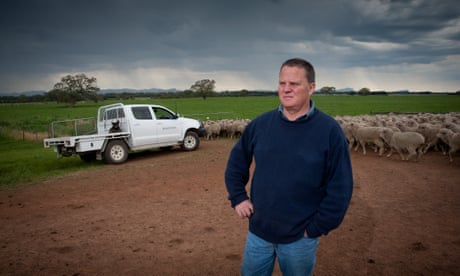- by foxnews
- 23 May 2025
‘Fix the faults’: Coles criticised for using carbon credits from controversial project
‘Fix the faults’: Coles criticised for using carbon credits from controversial project
- by theguardian
- 30 Oct 2022
- in news

A farmer who was assured by Coles that it would look for better carbon offsets for its "carbon-neutral" beef has described the supermarket's continued use of credits from the Queensland Armoobilla regeneration project as "outrageous", claiming the project is a "greenwash".
When carbon-neutral sheep and cattle farmer Mark Wootton called on companies to ensure the integrity of farm offsets used for carbon-neutral products back in April, Coles staff had assured him that the supermarket would "look for a better alternative" once their contract with Armoobilla finished in July.
"I had sympathy for Coles at first. They went to the umpire and the umpire said it was OK and then they backed it," said Wootton, who farms north of Hamilton in western Victoria but does not supply Coles.
"They need to take their own due diligence. They've had enough time to do it now."
Criticism of the Coles brand for its use of carbon credits from the Armoobilla reforestation site was widespread, considering that industry experts - including the former head of the emissions reduction assurance committee, Andrew Macintosh - claimed the site's total vegetation had decreased.
Macintosh's analysis found a 5,383ha decline in woodland coverage between 2015-2021. Moreover, the overall trend in vegetation coverage on the site was found to be highly correlated to that of the surrounding LGA of Quilpie.
"For lands to be eligible for inclusion in HIR [human induced regeneration] projects, it must be reasonable to expect that the project activities are necessary for the area to regenerate," Macintosh told the Guardian.
"Before the project commenced, there was significant regeneration across the project area, indicating that changes in grazing pressure were not necessary to trigger regeneration - what was needed was rain."
When asked about Macintosh's research, Corporate Carbon, which runs the site, pointed to a 2021 paper commissioned by the Clean Energy Regulator (CER) that exposed "foundational errors" in similar criticism of the HIR method.
"This kind of negative, unfounded attack is only damaging progress in this sector, rather than focussing on potential improvements and finding common ground for future development," said the Corporate Carbon managing director, Gary Wyatt.
However, Macintosh dismissed the report as "complete scientific nonsense" on account of its failure to use valid controls and its assumption of project activities starting five to seven years before they were registered.
"What they've done is gone to 'Paddock A' where the livestock have been excluded; and then they've actually drawn lines around the areas where woody vegetation is regrowing and then said, 'look, there's all this vegetation growing here'," he said.
"Science for 60 years on this topic has said that grazing in uncleared areas does not have much of an impact on vegetation cover."
The project has received 336,182 Australian carbon credit units from the CER, and is one of many projects that have been questioned by industry experts.
A spokesperson for Coles reiterated that the "offset units purchased for the program" had met the "rigorous requirements of the Australian government's Climate Active Carbon Neutral Standard".
In a statement to the Guardian, a CER spokesperson said that they were limited by legislation over what data and information about the project they could publicly release.
"It is not possible for the performance of a human induced regeneration project to be assessed with the information publicly available and imprecise satellite images as Prof Macintosh has tried to do," said the spokesperson.
"The CER uses a range of data sets and tools to assess whether regeneration activities are occurring, as well as the data supplied by the proponents that shows on-ground observations and measurements.
"Regrowth is gradual and it may be five to eight years before the satellite images start to show regrowth."
The CER also highlighted legislation introduced in 2019 that requires "regeneration checks" every five years, as further evidence of their commitment to transparency.
For carbon-neutral farmers such as Wootton, the controversy surrounding massive projects has the potential to hurt the overall credibility of the industry just as it begins.
"I am not trying to bag out Coles because we want big commercial business to be moving into this space," he said.
"They should just fix the faults in their system, otherwise they will hurt all of us."
- by foxnews
- descember 09, 2016
United Airlines flight returns to Hawaii after concerning message found on bathroom mirror; FBI investigating
United Airlines Flight 1169 to Los Angeles returned to Hawaii after a "potential security concern" aboard the plane. The FBI and police are investigating.
read more


